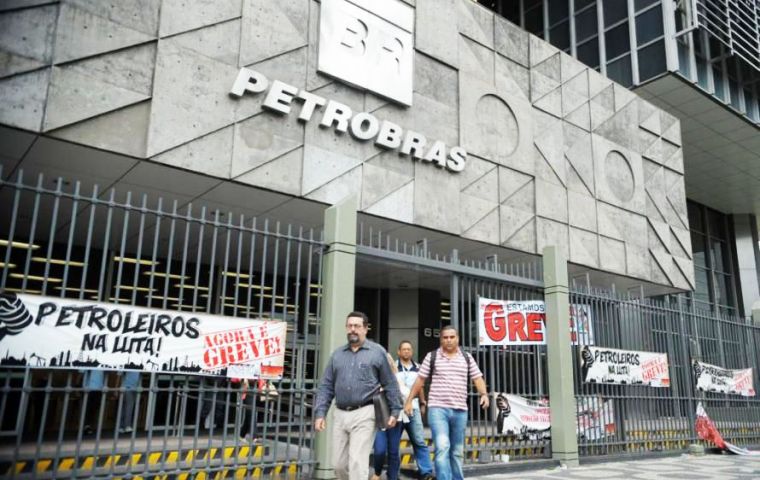MercoPress. South Atlantic News Agency
Debilitated Brazilian government challenged with an oil-workers 72-hour strike
 The oil sector strike included workers on at least 20 oil rigs in the lucrative Campos basin of 46 operated by Petrobras
The oil sector strike included workers on at least 20 oil rigs in the lucrative Campos basin of 46 operated by Petrobras  The oil strike was declared illegal by Brazil's top labor court on Tuesday, after Petrobras argued it was about politics rather labor issues.
The oil strike was declared illegal by Brazil's top labor court on Tuesday, after Petrobras argued it was about politics rather labor issues. Brazilian oil workers began a 72-hour strike on Wednesday in a new blow to President Michel Temer following a nationwide trucker protest that has strangled Latin America's largest economy for over a week. The strike affecting several rigs, refineries, plants and ports is the latest challenge for state-led oil firm Petrobras, whose shares have tumbled nearly 30% in two weeks over fears that political interference would unwind more investor-focused policies.
The oil sector strike included workers on at least 20 oil rigs in the lucrative Campos basin of 46 operated by Petrobras, as the company is known, according to FUP, Brazil's largest oil workers union. Petrobras said any disruption would not have an immediate major impact on its production or overall operations.
Brazil produces about 2.1 million barrels of oil per day, making it Latin America's largest crude producer.
The oil strike was declared illegal by Brazil's top labor court on Tuesday, after Petrobras argued it was about politics rather labor issues. FUP said it had not been informed of the
ruling.
According to a sources, Petrobras has a significant stock of fuel on hand, especially as a 10-day protest by truckers prevented significant amounts of fuel from leaving refineries. However, the strike has raised the specter of protests spreading to more sectors as Brazilians vent frustration with an unpopular government and an uneven economic recovery.
The truckers' highway blockades and resulting fuel shortages have already halted major industries and hammered exports of everything from beef and soybeans to coffee and cars.
FUP said on Wednesday that workers did not show up at work at eight refineries stretching from Manaus in the Amazon to Rio de Janeiro in the southeast. They also walked off the job at plants handling lubricants, nitrogen and shale gas, as well as in the ports of Suape and Paranaguá.
“Initial information points to the workers having adhered to the strike at various locations,” FUP said in a statement. “The movement is continuing through the morning, when stoppages at other Petrobras units are expected.”
Unions representing oil workers said they were demanding the resignation of Chief Executive Pedro Parente. They also want the end of a market-based fuel pricing policy and other changes at Petrobras since Temer took power in 2016.
Adding to turmoil at Petrobras, the firm said on Wednesday that board member José Alberto de Paula Torres Lima had resigned, citing “personal reasons.” He was one of three board members recruited by an outside agency and added to the board in April in an effort to establish its independence.
FUP union leader José Maria Rangel said on Tuesday the Temer government and Parente's policies were delivering Petrobras up to foreign investors, while “the shipyards of Rio de Janeiro are closed” as unemployment remains near record levels.




Top Comments
Disclaimer & comment rules-

-

-

Read all commentsBrazzil: “Brazilians Hoping Against Hope”:
May 31st, 2018 - 03:50 pm 0REF:
http://brazzil.com/brazilians-hoping-against-hope-presidential-election-will-give-their-country-a-new-start/
And to think that those in the right argued that president Dilma Rousseff had the country in a mess. After all, such is the result of 'populist' policies, right?
Jun 02nd, 2018 - 04:21 am 0Here's new president Michel Temer, working hard to show the world what a real mess looks like. Perhaps after his fall the know-it-all will say he was in fact a 'populist' in disguise?
NOW, Cheaper Fuel!
Jun 02nd, 2018 - 10:43 am -1https://i0.wp.com/www.humorpolitico.com.br/wp-content/uploads/2018/06/genildo.jpg?zoom=0.8999999761581421&resize=482%2C353&ssl=1
Commenting for this story is now closed.
If you have a Facebook account, become a fan and comment on our Facebook Page!